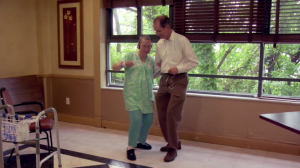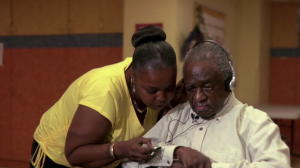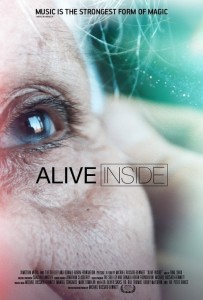 Alive Inside (Michael Rossato-Bennett, USA, 2014, 78 min)
Alive Inside (Michael Rossato-Bennett, USA, 2014, 78 min)
Sundance Cinemas through Oct 2»
No one would fault you for being emotionally overwhelmed by Alive Inside within its first two minutes. I certainly was, and quite unexpectedly so. But the film accesses so much emotion within that short time. As a 90-year-old woman is broken-heartedly unable to answer the interviewer’s question of what life was like when she was younger, saying that she has “forgotten so much,” the film keys into a deep fear of memory loss. When the interviewer (the film’s director) gives her headphones and plays a Louis Armstrong tune for her, the woman goes from apologetic to energetic, recalling all sorts of minutiae from her past. Most importantly, the music brings her an instant joy, which then instantly spreads to us.
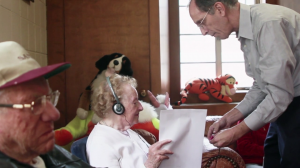 Alive Inside is the story of Dan Cohen, a former computer programmer who started a nonprofit organization called Music & Memory. His mission is straightforward: provide as many occupants of nursing homes—particularly Alzheimer’s/dementia patients—with some form of readily accessible music to attempt to help trigger memory and increase their quality of life. The film’s director had initially opted to follow Cohen for a day; he ended up following him for three years. The resulting documentary tells not only Cohen’s story, but the stories of many of the nursing home residents that he encountered.
Alive Inside is the story of Dan Cohen, a former computer programmer who started a nonprofit organization called Music & Memory. His mission is straightforward: provide as many occupants of nursing homes—particularly Alzheimer’s/dementia patients—with some form of readily accessible music to attempt to help trigger memory and increase their quality of life. The film’s director had initially opted to follow Cohen for a day; he ended up following him for three years. The resulting documentary tells not only Cohen’s story, but the stories of many of the nursing home residents that he encountered.
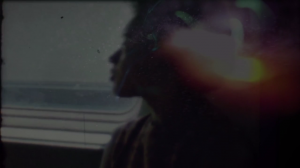 While watching the film, I was pleasantly surprised by several features of its style. Formally, the documentary genre has been increasingly drab in the past few years, and when a film comes along that exhibits some positive formal aspects, it should be praised for doing so. In the case of Alive Inside, the superimpositions of sound wave graphics with home movies and the actual interviewees bring a visual immediacy and impact that perfectly parallel the instantaneous elation that the interviewees feel in reaction to their music. The way the film turns the camera on the audience toward the end, capturing reactions to earlier scenes, provides a fascinating reflexivity in its call to action.
While watching the film, I was pleasantly surprised by several features of its style. Formally, the documentary genre has been increasingly drab in the past few years, and when a film comes along that exhibits some positive formal aspects, it should be praised for doing so. In the case of Alive Inside, the superimpositions of sound wave graphics with home movies and the actual interviewees bring a visual immediacy and impact that perfectly parallel the instantaneous elation that the interviewees feel in reaction to their music. The way the film turns the camera on the audience toward the end, capturing reactions to earlier scenes, provides a fascinating reflexivity in its call to action.
In the way that functional prose can sometimes be artful, so too do I find the editing of this film. It’s like good music in that way; it can seem improvised or almost too easy, but behind that easy feeling lies well calculated rhythm. The film’s style is far from perfect, however. Whenever any of the nursing home residents starts listening to the music, the song starts off as diagetic sound (i.e. within the film’s story space) and then transitions to nondiagetic sound (i.e. outside the story space). I find the diagetic sound to have far greater impact, because we are experiencing the music as the interviewees are, and I wish there was more of that kind of sound throughout the film.
At the level of argument, Alive Inside could do more. It provides a broad context in which its central goal is situated, but I would like to have heard more specifics about how this “quality of life” issue could be addressed within the current healthcare climate. The film engages with the ways in which music can benefit us neurologically, but it ultimately favors an appeal more emotional than scientific. In some ways, I would have liked more science, but in order to keep a crisp run time, the film also wants to focus on giving a voice to those who have effectively been rendered voiceless—the nursing home residents. And this is where the film excels.
As much as Alive Inside may break your heart, it will fill your heart even more. Its central ideas of everyone having something to give and the power of small kindnesses to rekindle the spirit are not overwhelming just in those first two minutes but in the other 76 as well. We reflect on the power of memory, the process of aging, the privilege of personal independence, and ultimately how little it sometimes takes to make an enormous difference in someone’s life. One of the film’s early subjects, Henry, captures this perfectly. When asked what he likes about music, Henry answers: “the feeling of love.”
Alive Inside is currently playing at Sundance as part of its Screening Room Calendar. It will only run through Thursday evening, after which it will end its Madison theatrical run. Before it leaves, I would highly recommend taking the time to see this documentary. What it may lack in argumentation, it makes up for in character and spirit.
